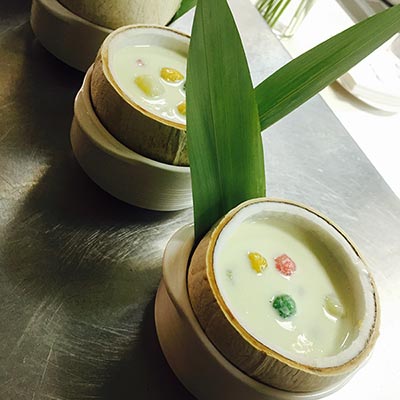Keeping it simple
 |
|
Rice ball soup in coconut milk. [Photo provided to chinadaily.com.cn] |
The guest chef notes that Thai food gets spicier when you get far away from the capital – and Phuket is many kilometers south of Bangkok. But he's prepared his tamarind sauce, which gives the salad its classic flavor, from scratch instead of using a prepared paste from a tube – which would typically overwhelm any fresh ingredients, he says.
Noppadon, whose angelic grin makes him a great ambassador for a country known as "the land of smiles", says something similar happens with chili paste. You can buy tubes of that, too, but they vary somewhat. Brands sold in Beijing are often too sweet for his taste, often gussied up with star anise, for example. The Phuket native thinks such flavors have there place – but elsewhere; his chili paste is fundamental: chili and oil.
That, he says, allows the flavors of his spicy and sour prawn soup with lemon grass (the classic tom yam goong), to shine through. The same thing happens in his green curry, rich and creamy with coconut milk. In Thai the dish is deceptively named geng kiew wan gai – wan means "sweet", but that is a reference to the color as much as the taste, which can be as spicy as any Thai curry.
Green curry, in fact, has plenty of devilish edge in it: The traditional broth is redolent with green chilies, shallots, garlic, galangal, lemongrass, kaffir-lime peel, coriander root, red turmeric roasted cilantro and cumin seeds, white peppercorns, shrimp paste and salt. Noppadon starts his creation with shrimp paste, not a prepared curry paste, and adds the rich mix of spices individually.
















